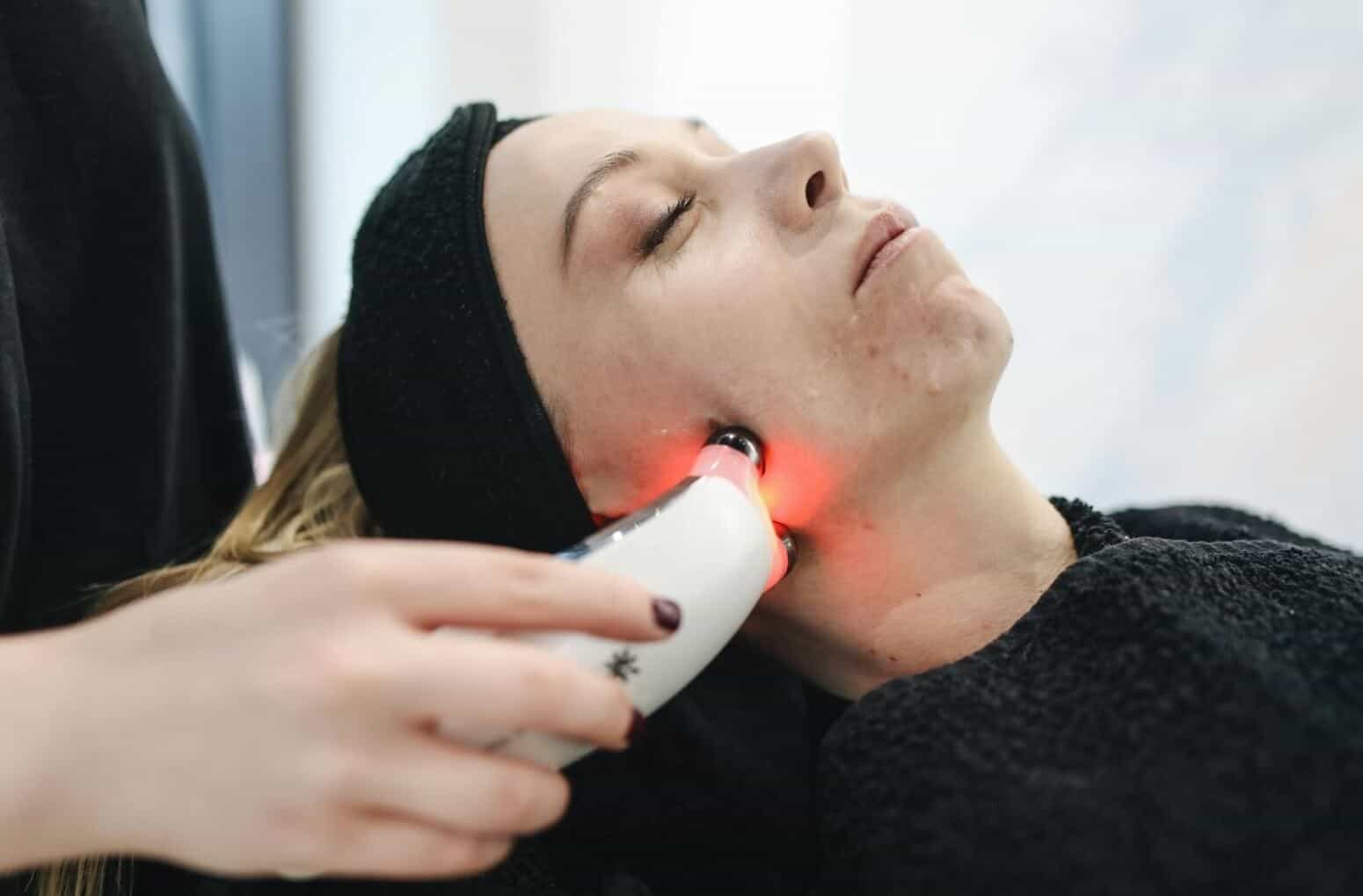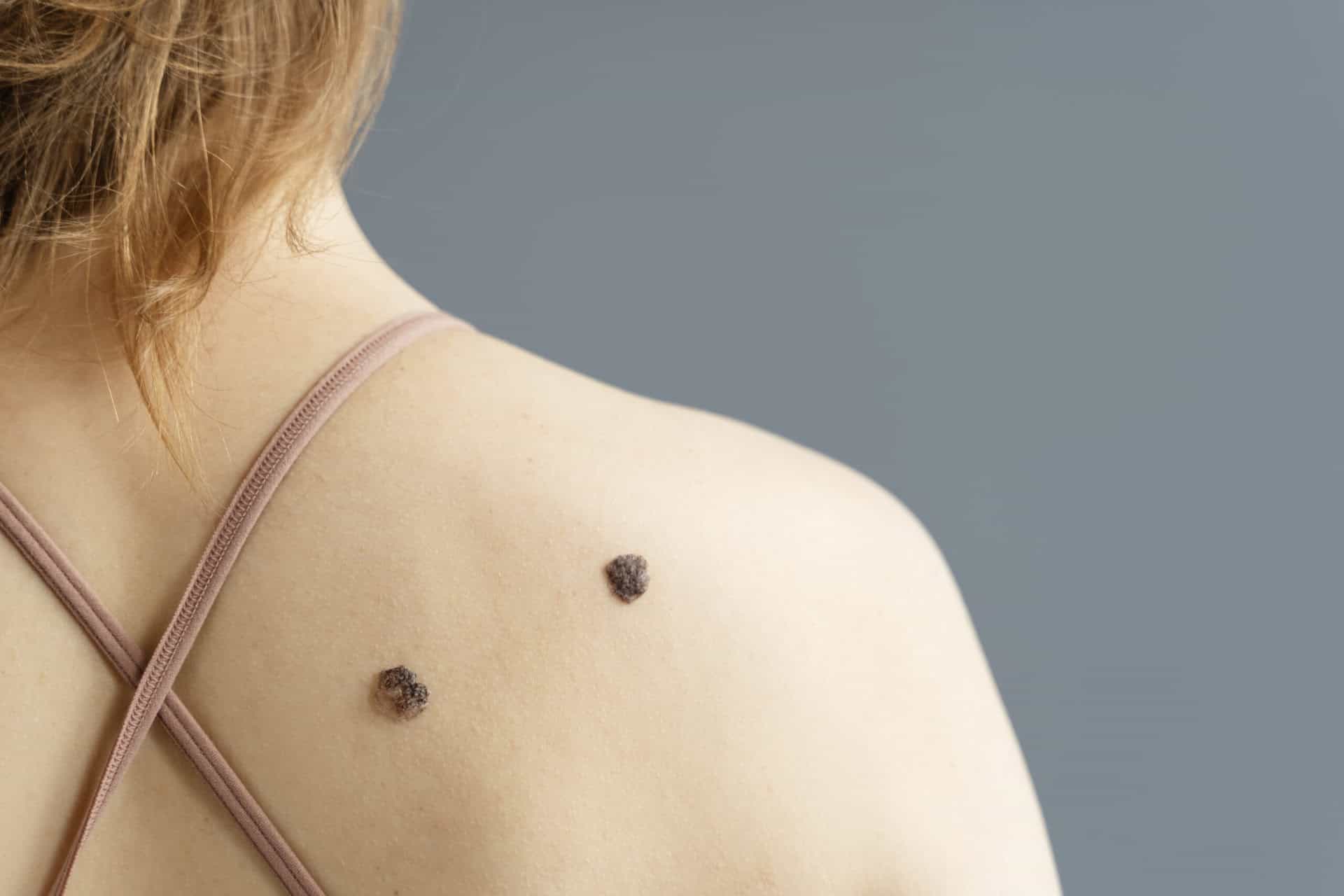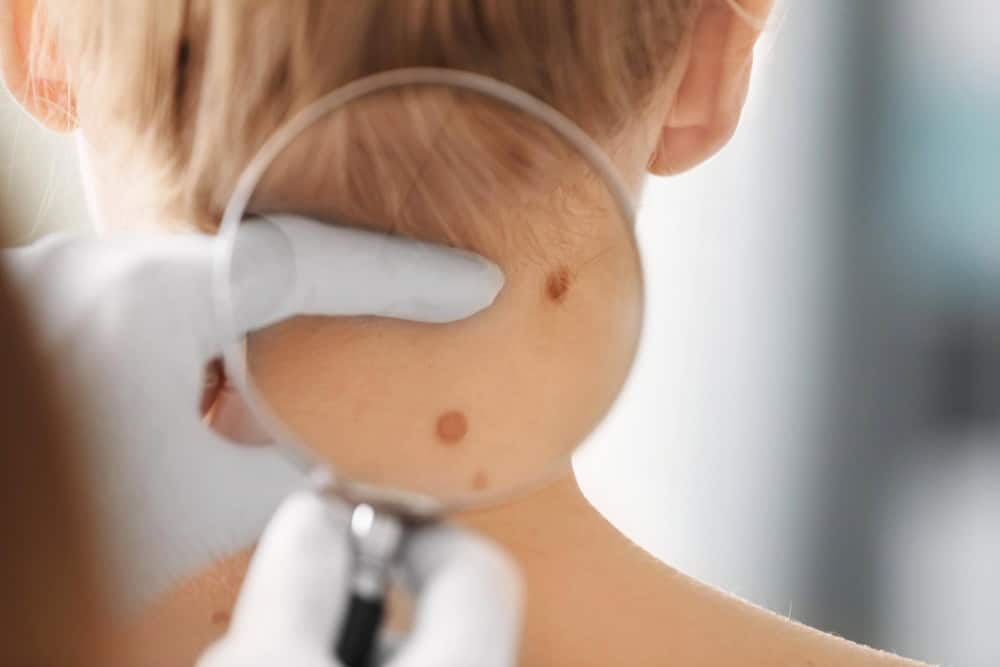Laser treatments are generally safe for acne-prone skin when performed by qualified professionals. They target sebaceous glands and bacteria while stimulating collagen production. Side effects are typically mild and temporary, with clinical studies confirming their safety profile for most patients.
- Dr Sharon Crichlow
- Reading Time: 10 Mins
For those struggling with persistent acne, laser treatments offer a promising solution when traditional methods fall short. Many patients worry about whether these advanced treatments are truly safe for their already sensitive, acne-prone skin. This concern is completely natural. So, we’ll discuss here how laser treatments work, their safety profile, potential risks, and the impressive benefits they can offer for clearer, healthier skin.
Key Takeaways
- Laser acne treatments work by targeting oil-producing glands and bacteria, addressing the root causes rather than just symptoms.
- When performed by qualified professionals, these treatments have a strong safety profile with mostly temporary, mild side effects like redness and swelling.
- Benefits extend beyond acne clearance to include improved scarring, more even skin tone, and longer-lasting results compared to topical treatments.
Table of Contents
What Are Laser Acne Treatments?
Laser acne treatments use focused light technology to target the root causes of acne without damaging surrounding skin. These innovative treatments work in several ways, depending on the specific technology used.
Most laser treatments for acne target the sebaceous glands, which produce oil (sebum) in the skin. When these glands produce excess oil, pores can become clogged, leading to acne breakouts. Laser treatments help regulate oil production by selectively heating these glands.
Some laser treatments, like our AviClear treatment, use a specific 1726nm wavelength that precisely targets sebaceous glands. This technology effectively reduces sebum production, addressing acne at its source rather than just treating symptoms.
Other laser types work by targeting the bacteria (P. acnes) that contribute to inflammatory acne. By reducing bacterial populations and inflammation, these treatments help clear existing breakouts while preventing new ones.
Many laser treatments also stimulate collagen production, which helps repair acne scarring and improve overall skin texture and appearance.
Safety Profile for Acne-Prone Skin
Clinical studies consistently demonstrate that laser treatments are safe for acne-prone and sensitive skin when performed correctly. The key is proper patient selection and treatment customisation.
Different laser systems offer varying safety profiles. Non-ablative lasers (those that don’t remove skin layers) like AviClear generally present fewer risks than ablative options, especially for sensitive skin types.
A study published in Lasers in Surgery and Medicine evaluated non-ablative fractional laser use within one month of isotretinoin therapy and found it to be safe, with no scarring or adverse healing. This challenges the outdated six-month wait rule and reinforces that non-ablative lasers can be safely used on sensitive, acne-prone skin.
Several factors determine whether laser treatment is appropriate for your skin:
| Factor | Why It Matters |
|---|---|
| Skin type | Darker skin tones may require specific lasers to avoid pigmentation changes |
| Acne severity | Different laser types work better for different acne severities |
| Medical history | Certain conditions or medications may contraindicate treatment |
| Previous skin reactions | Past skin sensitivities can predict potential responses |
A professional assessment before treatment is absolutely essential. At Aventus Clinic, our specialists thoroughly evaluate your skin condition, medical history, and treatment goals to determine the most appropriate laser option with the lowest risk profile.
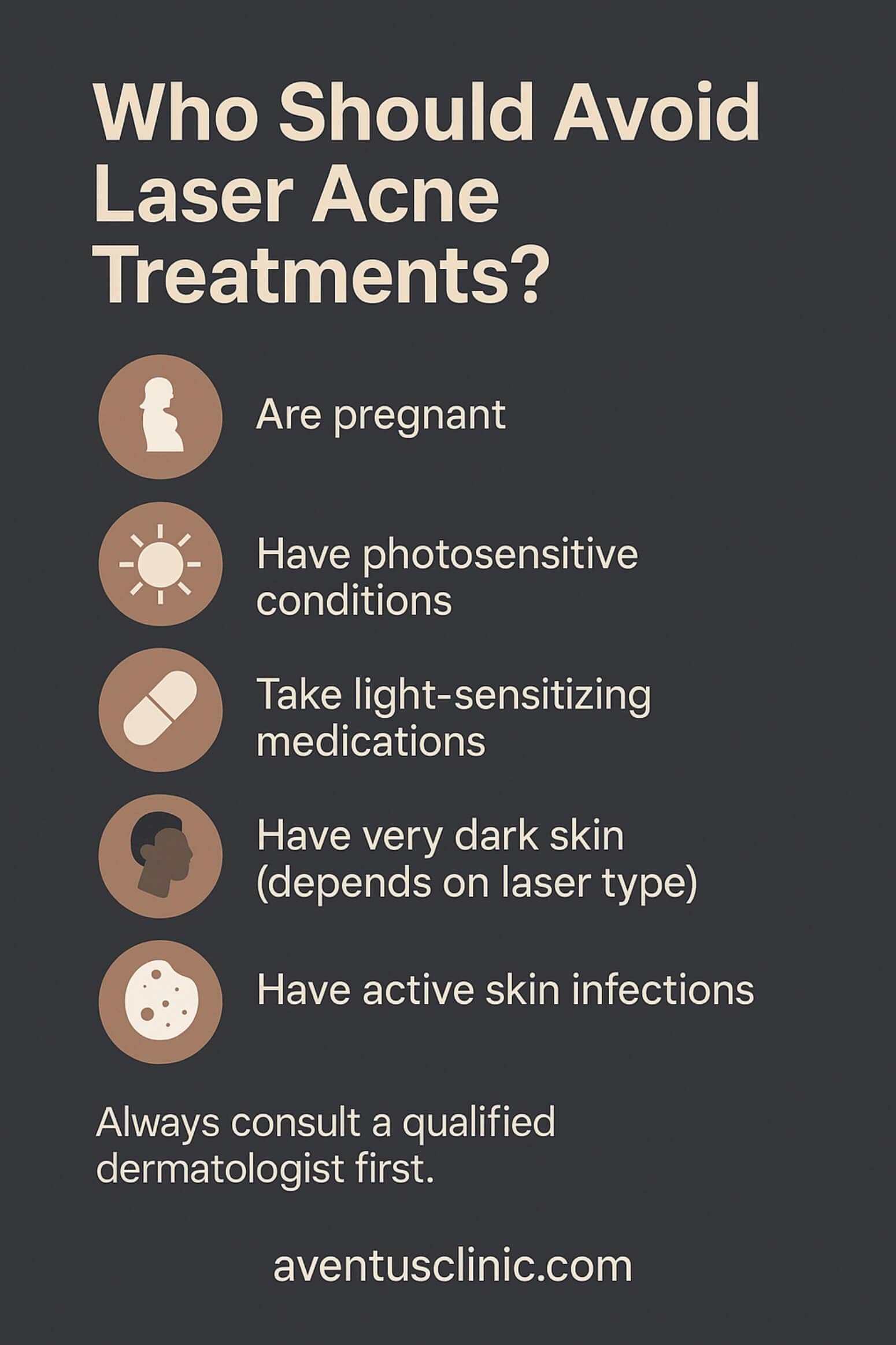
Potential Side Effects and Risks
Like all medical procedures, laser treatments for acne can cause side effects. Most are temporary and mild, resolving within hours or days.
Common temporary reactions include redness, slight swelling, and skin sensitivity. These typically subside within 24-48 hours. Your skin may feel warm, similar to a mild sunburn, immediately after treatment.
According to a 2025 systematic review published in Archives of Dermatological Research, dual-wavelength solid-state lasers (589/1319 nm) caused only mild and short-term side effects like redness and dryness when treating inflammatory acne, confirming the safety of laser therapy under professional care.
Rarer complications can include:
| Possible Complication | Likelihood | Prevention Measures |
|---|---|---|
| Temporary pigmentation changes | Uncommon | Proper laser selection, avoiding sun exposure |
| Blistering | Rare | Appropriate settings, skilled technician |
| Scarring | Very rare | Professional assessment, correct technique |
| Infection | Extremely rare | Proper sterilisation, aftercare compliance |
The risk of serious complications is minimised when treatments are performed by qualified professionals using appropriate technology for your skin type.
Benefits Beyond Acne Clearance
Laser acne treatments offer multiple benefits beyond simply clearing active breakouts.
Most patients see a significant reduction in active acne lesions within weeks of starting treatment. Clinical data shows that technologies like AviClear can reduce inflammatory acne by up to 80% within three months of completing the recommended treatment course.
Perhaps more impressively, these treatments address one of acne’s most stubborn problems, scarring. By stimulating collagen production deep within the skin, laser therapy gradually improves indented scars and uneven texture.
Skin tone improvement is another welcome benefit. Many patients notice reduced redness and more even pigmentation as the treatment progresses.
The psychological impact shouldn’t be underestimated. Clearer skin often translates to improved confidence and quality of life, particularly for those who’ve struggled with acne for years.
Unlike topical treatments that require constant application, laser treatments offer longer-lasting results. Many patients maintain clearer skin for months or even years after completing their treatment series.
Before and After Your Treatment
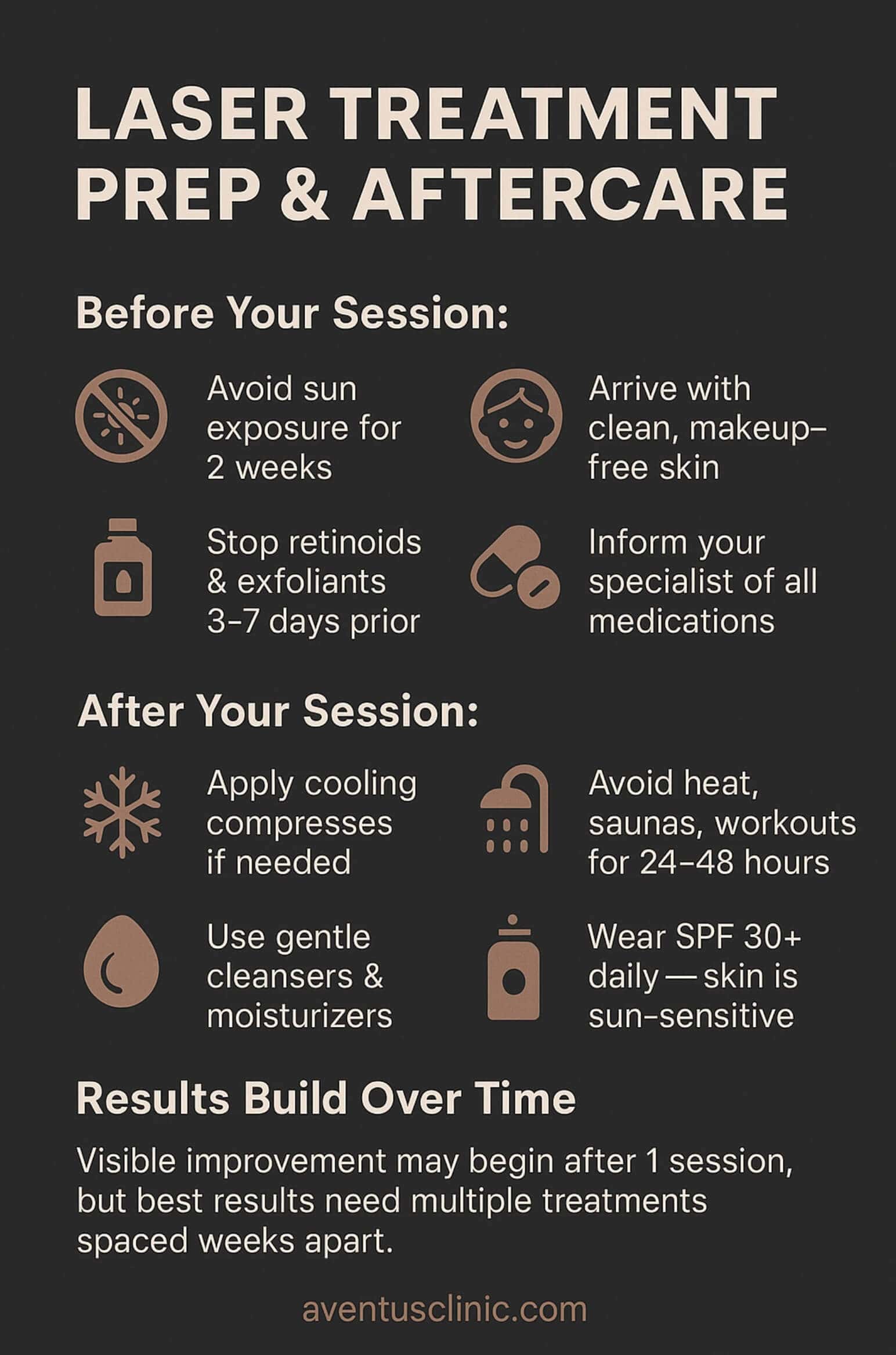
Conclusion
Laser treatments offer a safe, effective solution for acne-prone skin when performed by qualified professionals with appropriate technology. The key is personalised assessment and treatment planning.
If you’re tired of temporary solutions and ready for clearer skin, we invite you to book your free online assessment today. Our specialists at Aventus Clinic will help determine if laser acne treatment is right for you and create a customised plan for your skin’s specific needs.
Frequently Asked Questions
Can laser treatments cause acne to flare up initially?
Some patients experience a temporary “purging” effect where acne appears to worsen briefly after treatment. This typically resolves within a week as the skin begins to heal and respond to the therapy. This initial flare is not harmful and often indicates the treatment is working as intended.
How many sessions are needed for visible results?
Most patients require 3-6 sessions for optimal results. With AviClear specifically, a series of three 30-minute treatments spaced over three months is typically recommended. Individual needs vary based on acne severity and skin type.
Are laser treatments effective for cystic acne?
Yes, certain laser treatments can be effective for cystic acne. Technologies like AviClear that target sebaceous glands can reduce oil production that contributes to deep, painful cysts. However, severe cystic acne may require combination therapy for best results.
Can laser treatments cause pigmentation issues?
When performed correctly by experienced professionals, the risk of pigmentation issues is low. However, darker skin tones require special consideration and specific laser types to avoid hyperpigmentation or hypopigmentation. Our pre-treatment assessment identifies these risks.
Can laser treatment be combined with topical acne medications?
Many topical treatments can be continued during your laser treatment course, though timing is important. We typically recommend pausing certain products like retinoids before and immediately after treatments. Your specialist will provide a customised plan for integrating your existing skincare with laser therapy.
Is laser treatment suitable for all skin tones?
Modern laser technology has evolved to safely treat a wide range of skin tones. However, certain lasers are better suited for specific skin types. During your consultation, we’ll determine which treatment options are safest and most effective for your particular skin tone.
 Free Online Assessment
Free Online Assessment WHATSAPP
WHATSAPP
